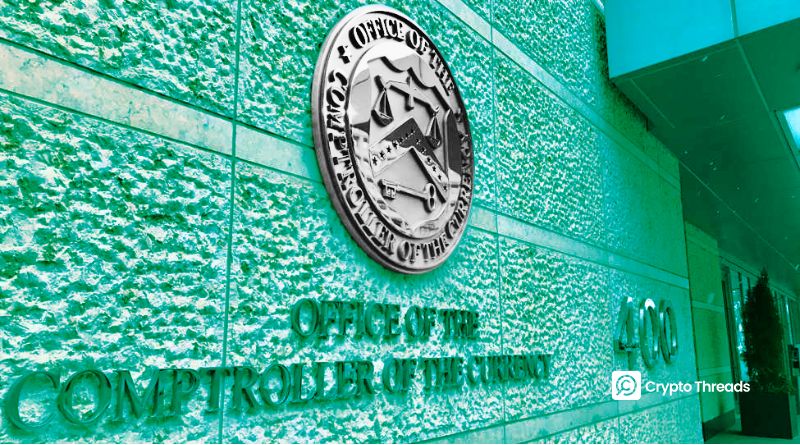OCC Clarifies: National Banks Can Now Buy and Sell Crypto Assets
Key Takeaways
- The OCC has clarified that national banks are permitted to execute cryptocurrency buy and sell orders on behalf of their customers.
- Banks can outsource crypto custody and trade execution services to third parties, provided they implement proper risk management practices.
- This guidance follows the OCC’s March letter rescinding its 2021 stance requiring banks to obtain supervisory approval before engaging in crypto-related activities.
- The move aligns with recent Federal Reserve and FDIC policy changes, reflecting a broader shift toward crypto-friendly regulation under the Trump administration.
OCC’s New Guidance Explained
The U.S. Office of the Comptroller of the Currency (OCC) has issued a landmark clarification, officially confirming that national banks and federal savings associations under its supervision can buy and sell cryptocurrency assets on behalf of their customers. This update was detailed in an interpretive letter released on Wednesday, May 8, 2025.
The guidance, known as Interpretive Letter 1184, outlines that banks may not only buy and sell digital assets held in custody at their customers’ direction but may also outsource crypto-related activities, such as custody and execution services, to qualified third parties. This outsourcing option provides banks with greater flexibility in how they approach crypto services, though it comes with the explicit condition that proper third-party risk management practices must be implemented.
“Regulated banks can provide custody services, including the safekeeping and secure storage of Bitcoin and other digital assets, on behalf of their customers. Additionally, the banks we supervise also may buy and sell cryptocurrencies they hold in custody at their customers’ direction.”— Rodney Hood, Acting Comptroller of the Currency
Services Banks Can Now Provide
Under the OCC’s clarified guidance, national banks can offer a comprehensive suite of cryptocurrency-related services to their customers, including:
- Buying and selling crypto assets on behalf of customers
- Custodial services for digital assets
- Facilitating cryptocurrency and fiat currency exchange transactions
- Transaction settlement and trade execution
- Recordkeeping and valuation services
- Tax reporting and compliance services
- Engaging sub-custodians for cryptocurrency holdings
The OCC has emphasized that while banks are now permitted to provide these services, they must do so within a framework of sound risk management. This means developing processes to ensure that any third-party providers or sub-custodians maintain proper internal controls to safeguard customer assets.
Impact on Banking and Cryptocurrency Markets
The OCC’s clarification is particularly significant given the rapid growth of the cryptocurrency market, which now includes over 50 million Americans. By enabling regulated banks to participate more actively in this space, the guidance creates several important opportunities:
- Banks can now meet growing customer demand for integrated cryptocurrency services
- Traditional financial institutions can expand their digital asset offerings without regulatory uncertainty
- Customers gain access to cryptocurrency services within the safeguards of the regulated banking system
- The cryptocurrency market may see greater institutional adoption and investment
This regulatory clarity enables banks to help customers manage their crypto portfolios just as they would traditional assets, with services like tax reporting and transaction recording, potentially enhancing mainstream adoption of digital assets.
What This Means for Consumers
For the average consumer, the OCC’s clarification potentially offers several benefits:
- Access to cryptocurrency services through familiar, trusted banking institutions
- Potentially enhanced security for digital asset holdings through regulated custodial services
- Simplified management of both traditional and crypto investments within a single financial relationship
- More comprehensive financial services, including tax reporting for cryptocurrency transactions
- Access to professional guidance on cryptocurrency investments from traditional financial advisors
As banks begin to implement these newly clarified services, consumers may find it increasingly convenient to participate in the cryptocurrency market through institutions they already trust for their traditional financial needs.



